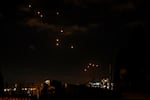
This picture shows projectiles above Jerusalem on Tuesday. Iran said it launched a missile attack at Israel in response to the killing of Hezbollah chief Hassan Nasrallah and other militant leaders last week.
Menahem Kahana
Iran launched a major missile strike that targeted sites across Israel, while Israel’s air defenses attempted to shoot down the incoming fire, Israeli officials said.
Air raid sirens wailed and loud booms were heard in Tel Aviv and throughout the country.
There was no immediate word on casualties or the amount of damage caused by the Iranian attack on Tuesday night.
President Biden directed the U.S. military to shoot down the missiles targeting Israel, helping Israel defend against Iranian attacks, the White House told reporters.
The Iranian strikes come in the wake of an escalating Israeli campaign against the militant group Hezbollah in Lebanon, including a ground campaign launched Monday. Israel is attempting to greatly weaken the group, which has been trained and armed by Iran for four decades.
Iran claimed the missile attack was in response to the assassination of Hezbollah's leader, Hassan Nasrallah. Nasrallah was killed in an Israeli airstrike in Beirut Friday, which killed 39 people, according to Lebanese health officials.
In a statement on the social media platform Telegram, released shortly after the Iranian airstrikes began, Iran’s Revolutionary Guard Corps said it focused on “important military targets” in Israel with dozens of missiles. The statement said that if Israel responds, “it will face violent attacks.”
The U.S Embassy in Jerusalem directed government employees and their family members to shelter in place until further notice.
Loading...
Israeli civilians took to bomb shelters nationwide before and during the strike. But a short while later, Israelis received an official notice saying they could come out of the shelters. Meanwhile, Jerusalem and Tel Aviv have been put under tight restrictions including new limits on gatherings in any urban centers.
Biden and Vice President Harris are monitoring the attack from the White House Situation Room and receiving regular updates from their national security team, the White House said.
Israeli airstrikes across Lebanon have killed more than 1,000 people in the past two weeks and forced many civilians to flee their homes, according to Lebanon's Health Ministry. The strikes have targeted Hezbollah and its weapons, killing Nasrallah and several other top officials, as well as many civilians.
Hezbollah began firing rockets into northern Israel last Oct. 8 — one day after Hamas launched a major attack into southern Israel. Hezbollah describes its effort as an act of solidarity with the Palestinians.
Over the past year, Israel and Hezbollah have been firing almost every day across the Israel-Lebanon border. But the shooting remained at a relatively low level until Israel unleashed a much larger campaign two weeks ago.
Back in April, an Israeli strike killed several leaders of Iran’s Revolutionary Guard Corps in Damascus, Syria.
Iran responded by attacking Israel with more than 300 drones and missiles, but nearly all were intercepted by Israel and its allies, including the United States. A few missiles did cause some damage. A 7-year-old girl was severely injured and a military base in southern Israel suffered minor damage, according to Israeli officials.
Hadeel Al-Shalchi reported from Tel Aviv. Greg Myre reported from Washington, D.C.